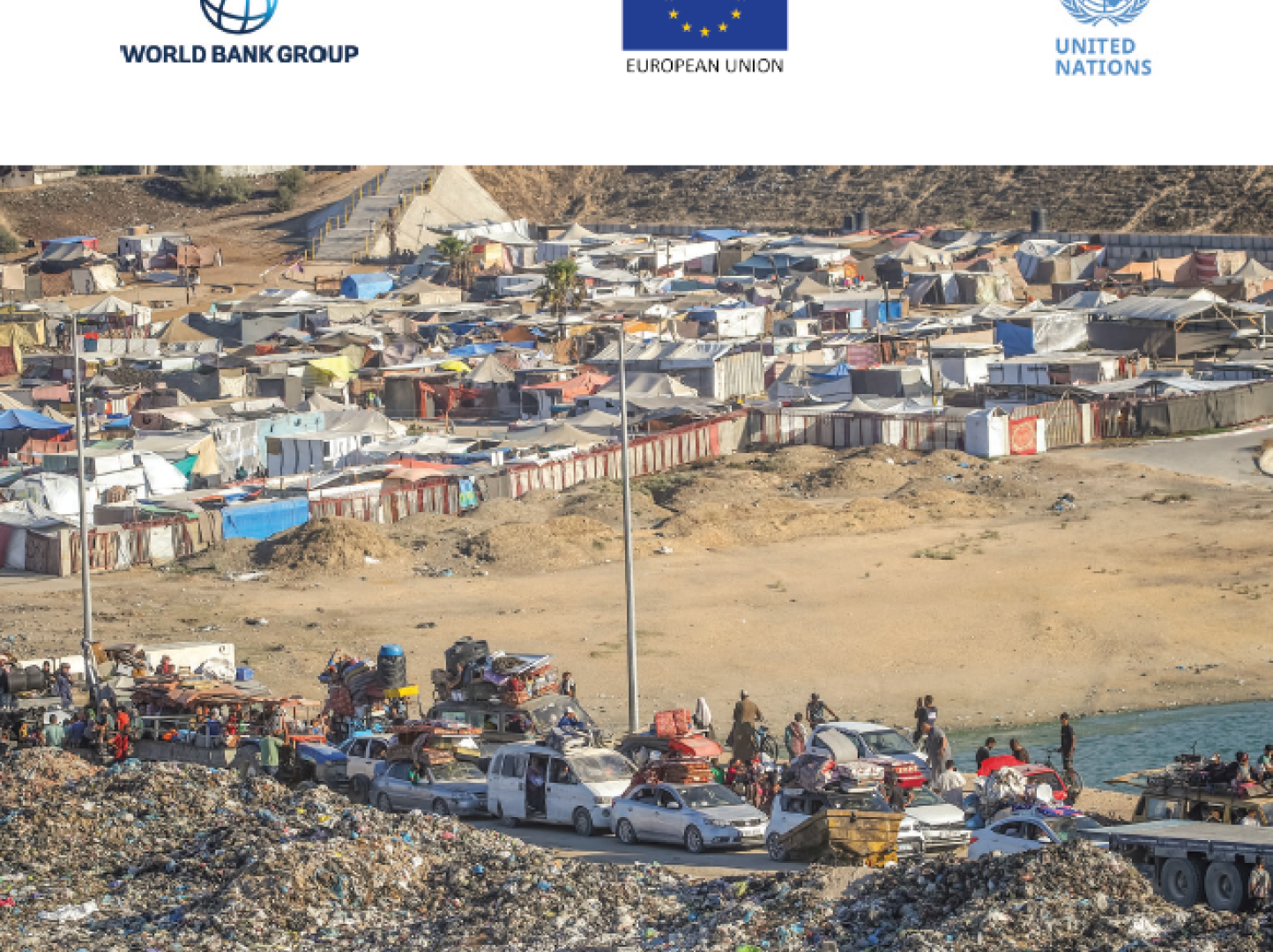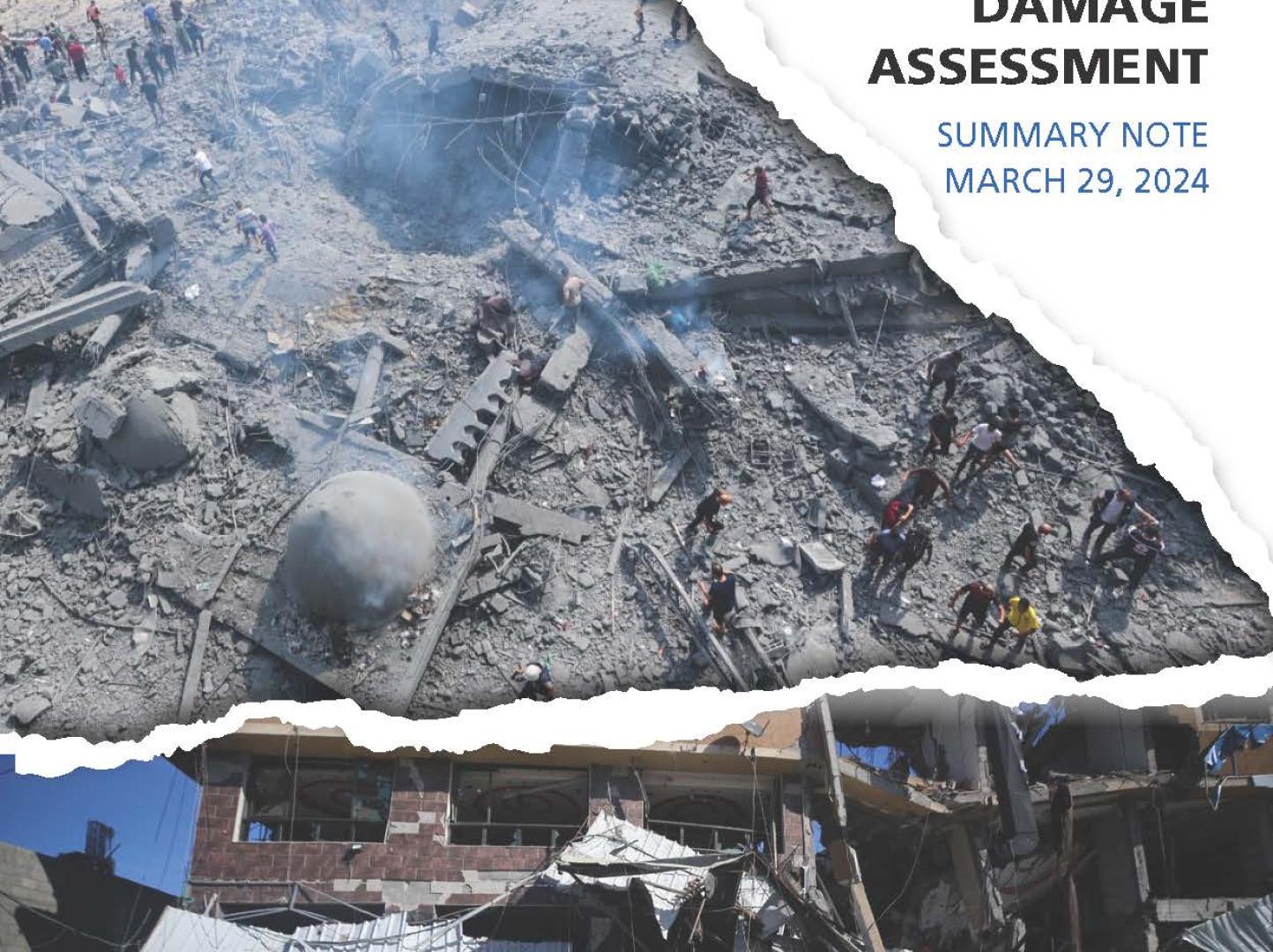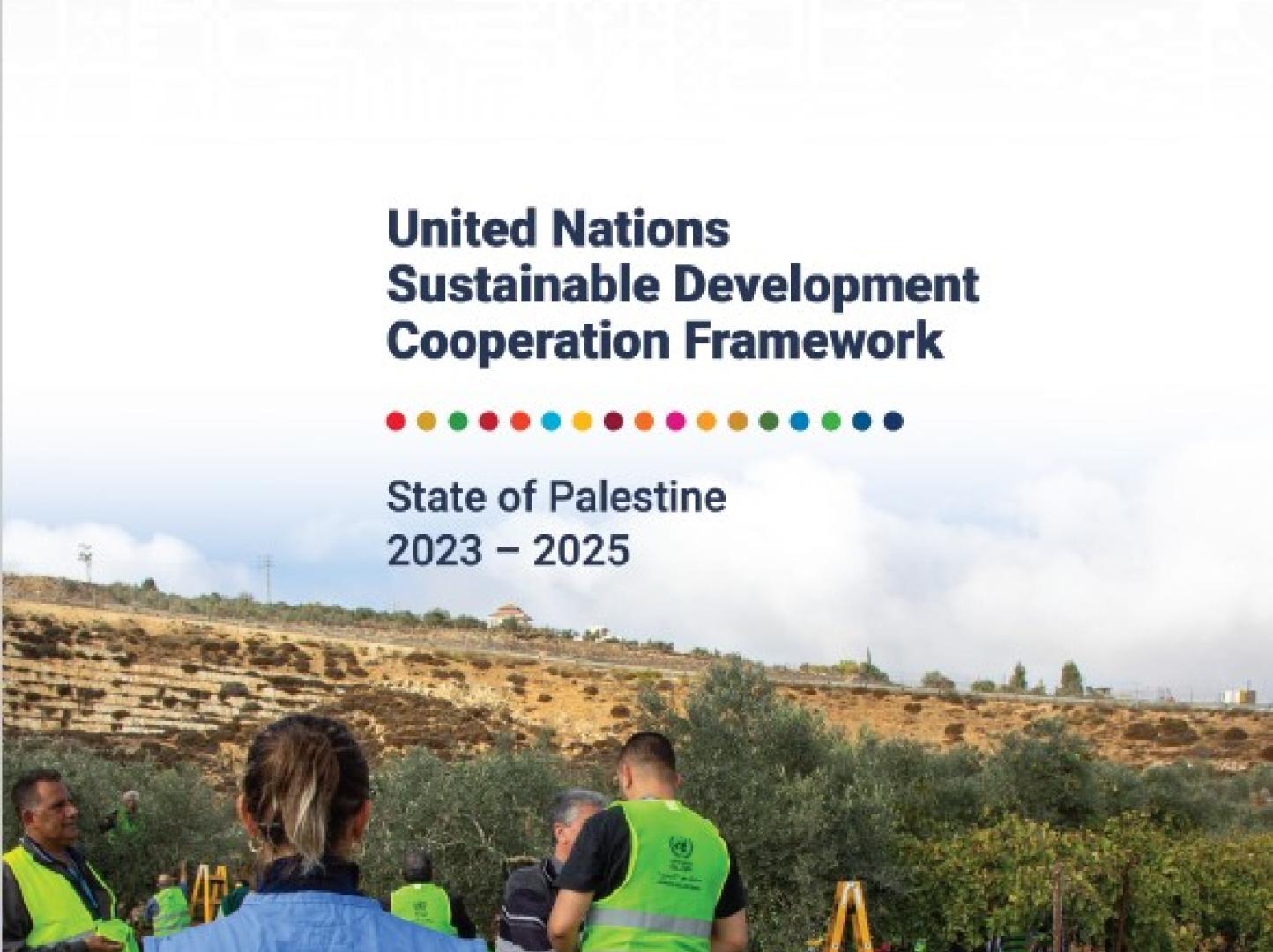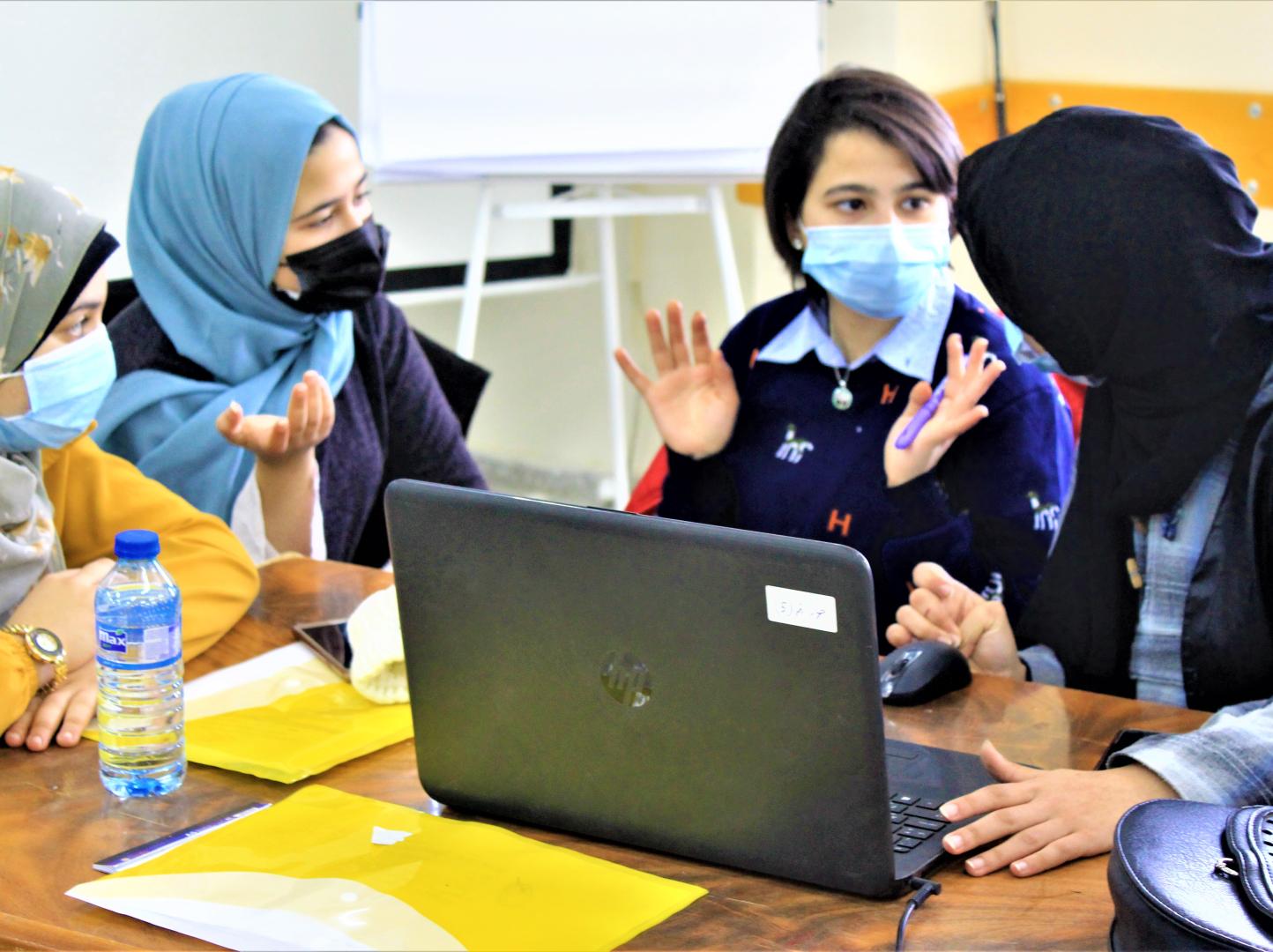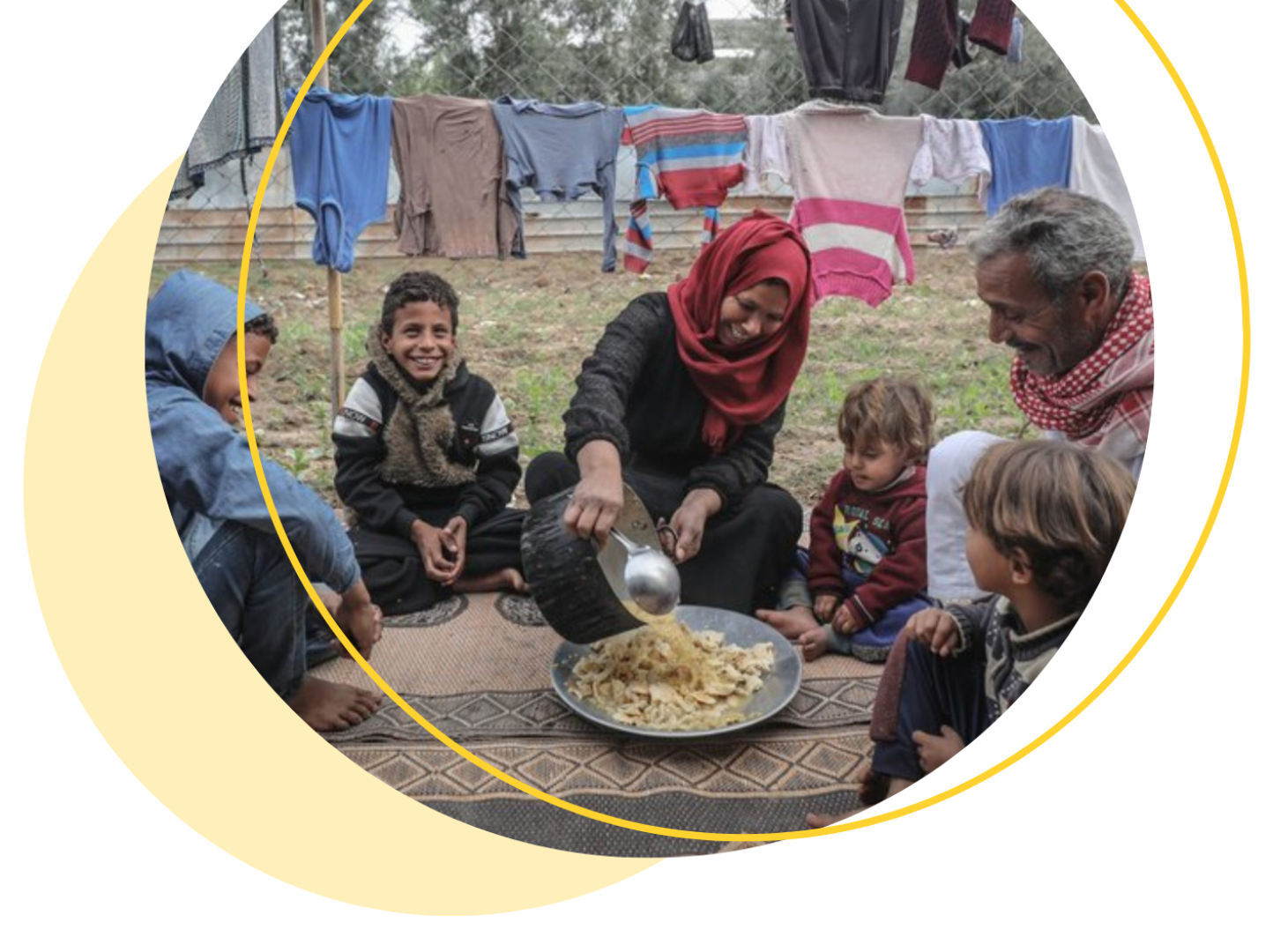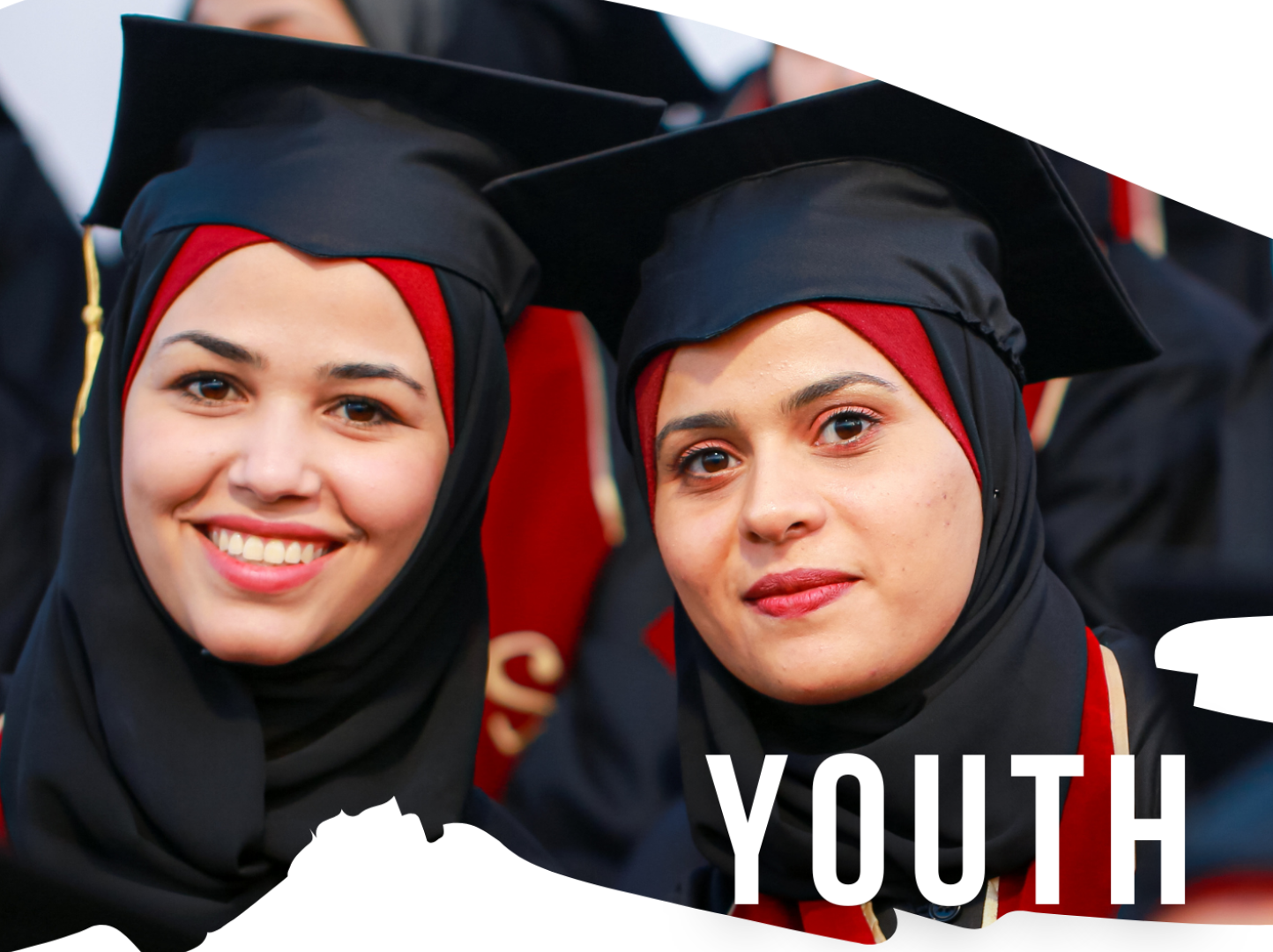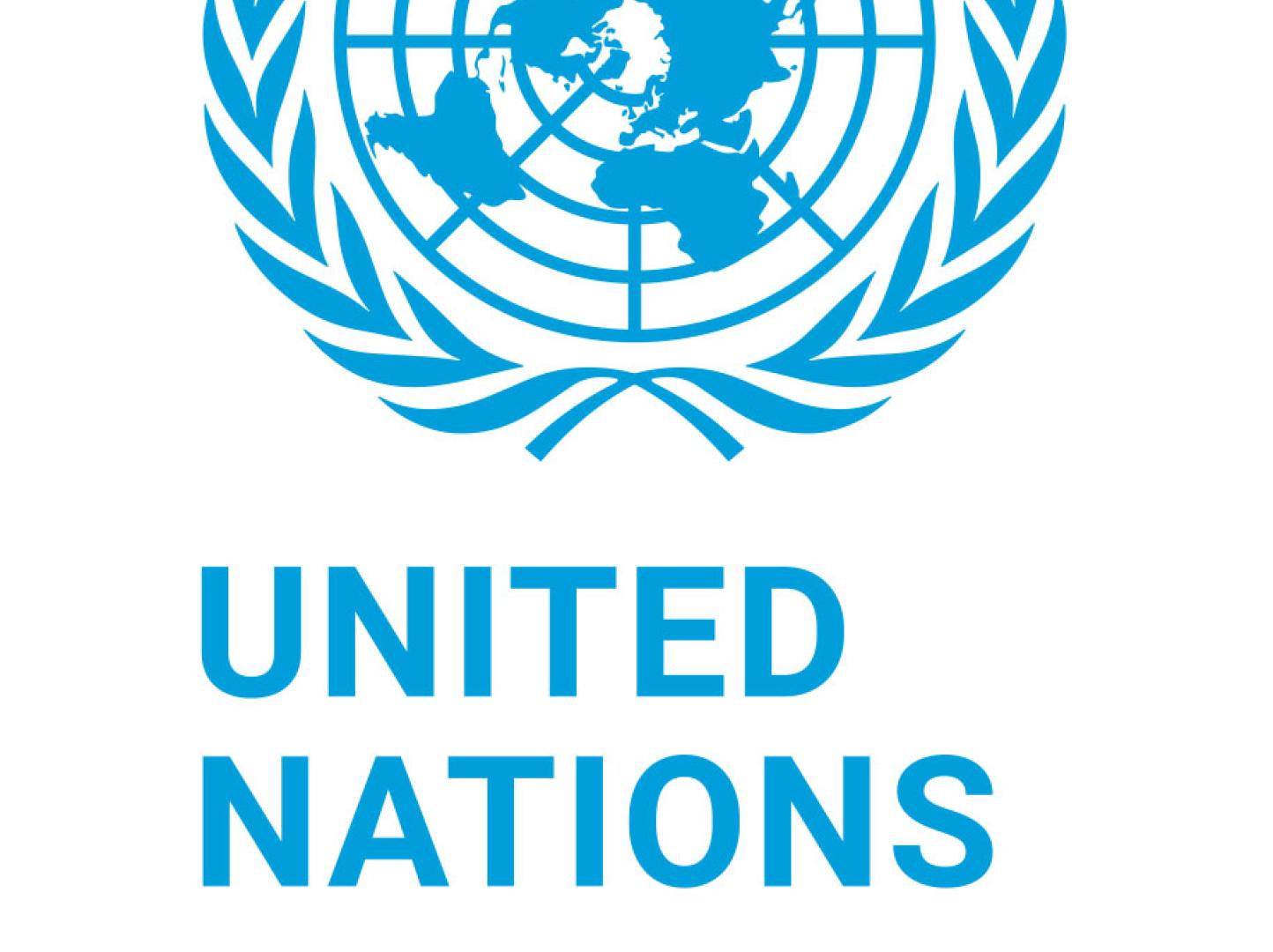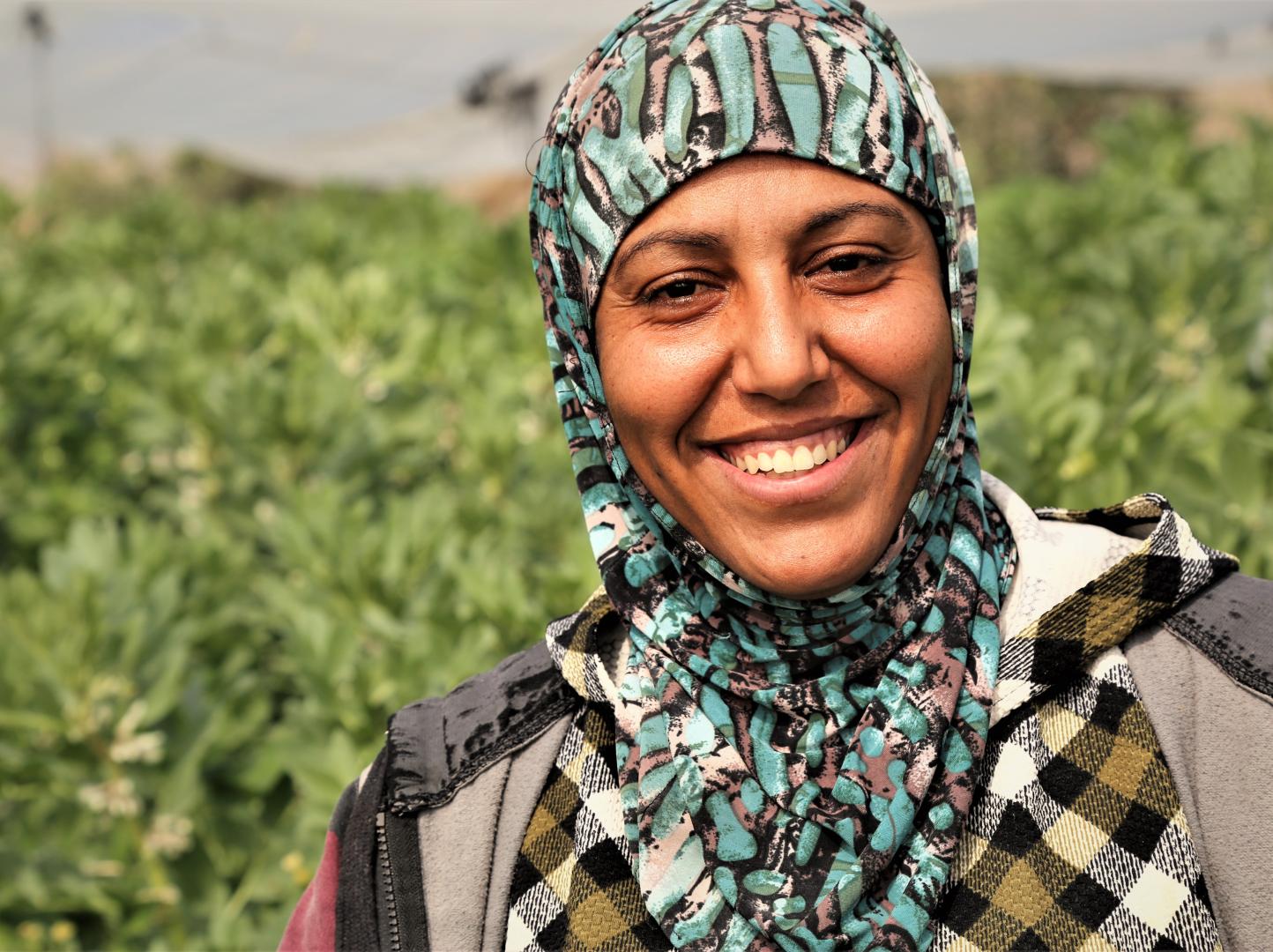Latest
Press Release
28 November 2025
OHCHR: We are apalled at the brazen killing of two Palestinian men in Jenin
Learn more
Story
26 November 2025
The Occupied Palestinian Territory is now in its deepest economic crisis ever recorded
Learn more
Story
26 November 2025
Gaza women are ‘last line of protection’ for their families amid attacks, hunger and harsh winter
Learn more
Latest
The Sustainable Development Goals in Palestine
The UN and its partners in Palestine are working towards achieving the Sustainable Development Goals: 17 interconnected Goals which address the major development challenges faced by people in Palestine and around the world. These are the goals the UN is working on in Palestine:
Story
26 November 2025
The Occupied Palestinian Territory is now in its deepest economic crisis ever recorded
The Occupied Palestinian Territory is now in its deepest economic crisis ever recorded, with Gaza suffering an “unprecedented and catastrophic” collapse, according to a new report from the UN Conference on Trade and Development (UNCTAD) presented in Geneva on Tuesday.Speaking at the launch of UNCTAD’s 2025 Report on the Economy of the Occupied Palestinian Territory, the agency’s Deputy Secretary-General Pedro Manuel Moreno said decades of movement restrictions, combined with the latest military operations, had “wiped out decades of progress” and left both Gaza and the West Bank facing long-term devastation.“What we see today is extremely worrying,” he said. “Gaza is going through the fastest and most damaging economic collapse ever recorded.”Gaza GDP down 83 per centUNCTAD’s data shows that in 2024, Gaza’s GDP collapsed by 83 per cent compared to the previous year.GDP per capita fell to just $161 a year, less than 50 cents per day, among the lowest anywhere in the worldGaza’s economy now stands at just 13 per cent of its 2022 sizeSenior economist Mutasim Elagraa, who coordinates UNCTAD’s programme supporting the Palestinian people, said the collapse was so severe that it had erased seven decades of human development in the enclave.“Gaza’s economy has lost 87 per cent of its value since 2022,” he said. “GDP per capita has reverted to levels seen 22 years ago. This is the worst economic crisis on record, anywhere in recent decades.”Mr. Elagraa warned that national unemployment has hit 50 per cent, and unemployment in Gaza is now over 80 per cent. “Multidimensional poverty now engulfs all Gazans,” he added.West Bank also facing its deepest downturnThe West Bank is experiencing its worst contraction ever recorded, with GDP falling by 17 per cent in 2024 and per-capita income dropping nearly 19 per cent.UNCTAD says the combination of:rising insecurity,intensified movement and access restrictions,expanding settlements, andthe loss of access to 60 per cent of West Bank landhas “suppressed the economy for decades” and severely limits future recovery.Mr. Moreno said the fiscal situation facing the Palestinian government is now “the worst in its history”, driven by collapsing revenues and withheld fiscal transfers, which account for more than two-thirds of Palestinian tax income.Education system destroyed — human capital 'set back a generation'The report warns that the destruction of all schools and universities in Gaza has left children out of education for more than two years — a loss of human capital that will harm society “for generations to come.”Mr. Elagraa said this alone represents the collapse of a quarter-century of human development, adding that “education, skills, and the entire human development base have been shattered. Gaza has lost 70 years of human development.”$70 billion needed to rebuild — recovery will take decadesAccording to joint estimates by the UN, the European Union and the World Bank, more than $70 billion will be required to rebuild Gaza.Mr. Elagraa said that even in the most optimistic scenario, with full access for reconstruction materials and generous international aid, “it will take decades for Gaza to regain the level of economic activity it had before the latest conflict.”He added that simply removing rubble could take 22 years, based on past reconstruction efforts, and up to 10 years may be needed just to clear unexploded ordnance.Ceasefire is essential — and humanitarian access “cannot wait”All three UNCTAD speakers emphasised that no economic recovery is possible without a durable ceasefire.Mr. Moreno said the ceasefire agreed in October 2025 offers a “critical opportunity” but warned that assistance must flow now.“Humanitarian assistance cannot wait,” he said. “A lasting ceasefire is essential to stabilise the economy and allow reconstruction to begin.”Mr. Elagraa added that development could only restart when:humanitarian goods can enter freely,rebuilding materials are permitted, andmovement and access restrictions are eased.He described recent improvements as “positive but slow, frustrating but moving in the right direction.”Agriculture devastated — 86 per cent of cropland damagedUNCTAD confirmed that Gaza’s agricultural sector has been “severely crippled.”Drawing on comments from UNCTAD Secretary-General Rebeca Grynspan, officials said:86 per cent of cropland has been damaged83 per cent of water wells destroyed71 per cent of greenhouses damagedOnly 1.5 per cent of farmland remains usable89 per cent of water and sanitation facilities are destroyedSoil contamination from explosives — detonated and unexploded — will require major international intervention.
1 of 5
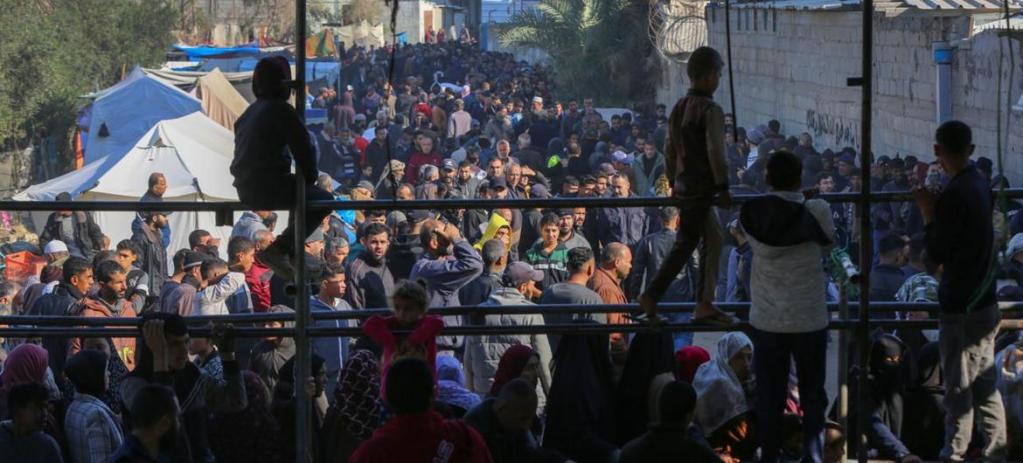
Story
26 November 2025
Gaza women are ‘last line of protection’ for their families amid attacks, hunger and harsh winter
Women in Gaza are ensuring their families’ survival “with nothing but courage and exhausted hands” while violence continues and essentials remain in short supply, the UN’s gender equality agency warned on Tuesday.UN Women’s Chief of Humanitarian Action Sofia Calltorp, who just returned from a visit to the enclave last week, said that women there repeatedly told her “there may be a ceasefire, but the war is not over”.“The attacks are fewer, but the killings continue,” she said.The UN aid coordination office, OCHA, warned on Monday that hostilities continued to be reported in various parts of the Gaza Strip, causing destruction, displacement and casualties.UN Children’s Fund (UNICEF) said last week that since the Hamas-Israel pause in fighting was announced on 10 October, children were being killed in attacks in the enclave at a rate of two a day.Struggling to surviveBriefing reporters in Geneva Ms. Calltorp recounted that during her trip which spanned the entire length of the Strip “from Jabalia in the north to Al-Mawasi in the south”, she saw that “to be a woman in Gaza today means facing hunger and fear, absorbing trauma and grief, and shielding your children from gunfire and cold nights”.“It means being the last line of protection in a place where safety no longer exists,” she insisted.Ms. Calltorp said that more than 57,000 women in Gaza now head their households and are left alone to struggle in supremely harsh conditions.“Women showed me how water soaked through their makeshift tents, leaving the children shivering throughout the night,” she explained.“This is what it means to be a woman in Gaza today, to know that winter is coming, and to know you cannot protect your children from it.”Food still scarceThe senior official told the story of a woman she met whose home had been destroyed – “but every morning, she returns to the rubble to gather wood, burning the doors that once sheltered her family just to make breakfast for her children.”A month and a half into the ceasefire food is still scarce and four times more expensive than before the war – as an example, an egg costs $2.00 on the market in Gaza – which is “out of reach for women with no income”, she said.“It's completely impossible for many of the women that I met to feed their families,” Ms. Calltorp insisted.Displacement and disabilityThe women whom she talked to had been displaced “countless times”, she said – as many as 35 times since the start of the war in October 2023 in one case.“Every move means packing the little they have, carrying their children, their elderly parents, choosing between one unsafe place and another,” Ms. Calltorp explained.She also mentioned the “crisis of women and girls newly disabled by this war”, with over 12,000 of them living with long-term war-related disabilities.With so much stacked up against them and their families, Gaza’s women “need the cease-fire to hold, they need food, they need cash assistance and they need winterization supplies, health services and vital psychosocial support,” the UN Women official said. She stressed how eager they were “to work, to lead and to rebuild Gaza with their own hands”.“No woman or girl should have to fight this hard just to survive. We need more aid to enter into Gaza systematically and safely, and we need the killings to stop,” she concluded.
1 of 5

Press Release
25 November 2025
Statement by DSC/RC/HC Dr. Ramiz Alakbarov on the Launch of the 16 Days of Activism Against Gender-Based Violence
I extend my deepest appreciation to the Ministry of Women’s Affairs, the Ministry of Social Development and the Palestinian NGO Forum. This campaign begins at one of the most difficult moments in Palestine’s history. Violence against women remains one of the most widespread human rights violations.This year’s campaign honours women and girls rebuilding what crises have destroyed — from war-affected mothers protecting their families to humanitarian workers and community leaders driving relief, psychosocial support, and human rights advocacy in Palestine. Continued occupation and the devastating impact of the past two years of violence and instability in Gaza and the West Bank have further heightened the risks.Women and girls across the occupied Palestinian territory are enduring unprecedented loss, violence, and insecurity. Yet, despite the enormity of the daily challenges, they continue to demonstrate profound courage, leadership and resilience, while working tirelessly to support their families and communities under increasingly harsh conditions.Building the foundations of a sustainable peace requires the systematic engagement of women at all levels. Through their leadership, Palestinian women are shaping political priorities and governance, guiding public policy, and building stronger institutions. Combating gender-based violence requires collective action, political will, robust institutions, investment in services, and accountability, ensuring prevention and protection are fully integrated into national systems. The United Nations and its partners remain committed to integrating gender equality into all planning and coordination, supporting women and girls through protection services, psychosocial support, and enhanced leadership opportunities, while strengthening women’s organizations and civil society. Our message is clear: women must not only survive; they deserve dignity, respect, safety, and equal opportunities to rebuild their homeland. This crucial campaign aims to amplify women’s voices and strengthen pathways to safety and empowerment. I encourage everyone to take action and promote change. From survival to strength, together we can build a more just and safer Palestine for all.
1 of 5
Story
25 November 2025
Security Council must seize ‘moment of renewed hope’ in Gaza
The UN Deputy Special Coordinator for the Middle East Peace Process told the Security Council on Monday. Ramiz Alakbarov briefed on conditions in the battered enclave and the occupied West Bank, before touching on developments in Lebanon and Syria.“Today we meet at a moment of renewed hope,” he said, speaking from Jerusalem. “While progress on the ground is fragile and deep uncertainty persists, we must seize the opportunity before us to chart a better future for Palestinians, Israelis and the wider region.”Fragile ceasefire at riskLast month, Israel and Hamas reached agreement on the first phase of a ceasefire and hostage release following a plan put forward by United States President Donald Trump. However, recent Israeli airstrikes on populated areas have caused numerous casualties and destruction, while Palestinian militant attacks on Israeli soldiers have resulted in fatalities.“This violence is jeopardizing the fragile ceasefire,” Mr. Alakbarov said, urging all parties “to exercise restraint and fulfill their commitments under the agreement.” ‘First glimmers of respite’The Security Council “has also taken an important step in the consolidation of the ceasefire” with the adoption of resolution 2803 (2025), he added.The text endorses the US plan and the deployment of a temporary international force for Gaza.“While still facing unbearable living conditions and seemingly insurmountable destruction, the people in Gaza have experienced at least the first glimmers of respite from the near constant bombardment of the last two years,” he said.At the same time, Israeli families have been reunited with relatives who were held hostage. Others have received the remains of their loved ones, although the bodies of three hostages have yet to be returned.Displacement, damage and destructionMr. Alakbarov reported that “the UN has redoubled efforts to mobilize and scale up humanitarian assistance” in Gaza, but efforts must be expanded.He highlighted the grim situation on the ground, including more than 1.7 million people still displaced and almost 80 per cent of buildings damaged or destroyed.The senior official visited the shattered enclave last week, where “the picture remains bleak,” stressing the “critical need to transition from emergency humanitarian assistance toward enabling communities to rebuild their lives and restore essential services.”Restore dignity and hopeHe said that “the damage in Gaza – physically, economically and socially – is catastrophic.” Therefore, the international community cannot only address immediate physical needs, but also psycho-social needs, social cohesion and justice issues. “There must be a restoration of dignity and hope,” he said. “These efforts must be anchored in a clear political horizon for resolving the conflict, ending the unlawful occupation, and realizing the two-State solution.”‘Alarming’ violence in the West BankMeanwhile, in the West Bank “settlement expansion, the proliferation of outposts, violence, including settler violence, displacement, and evictions continue to escalate at alarming levels,” he reported. Israeli military operations, particularly in the north, have resulted in deaths, destruction and continued displacement of thousands of Palestinians from refugee camps.“Settler violence has reached emergency levels,” he said. “In October, during the olive-harvest season, the UN recorded the highest number of settler attacks on Palestinians since UN monitoring began — an average of eight per day.”Additionally, arson attacks and the desecration of holy places by settlers have further heightened tensions, while attacks by Palestinians – including acts of terror, such as a recent ramming and stabbing attack south of Jerusalem – have occurred.He insisted that all perpetrators of violence must be held accountable.Concern for Lebanon and SyriaTurning to the wider region, he reiterated the UN Secretary-General’s call for parties in Lebanon to uphold their obligations to maintain the cessation of hostilities.The agreement, reached between Israel and Lebanon in November 2024, followed more than a year of fighting between Israeli forces and Hezbollah militants in Lebanon, linked to the Gaza war.The top official also echoed the Secretary-General’s call for an immediate cessation of all violations of Syria’s sovereignty and territorial integrity.Challenges require commitmentReturning to Gaza, Mr. Alakbarov said that decisions made now will determine whether the ceasefire endures or unravels. He underscored that the first phase of the deal must be fully implemented, and the parties must urgently reach agreement on the modalities to carry out the next stages.“The challenges remain immense, but the cost of failure is unimaginable. We have the tools to lay the foundations for success, but the work ahead demands an unwavering commitment from everyone,” he said.He said the UN “remains committed to seizing this critical opportunity to move from crisis management to conflict resolution,” and all efforts “must be guided by the imperative of establishing a genuine political process that will resolve the Israeli - Palestinian conflict once and for all.”
1 of 5

Story
25 November 2025
Amputee footballers reclaim hope amid Gaza’s ruins
Today – amid a fragile ceasefire and the devastation of her homeland – she stands on the football pitch not only as a player, but as a symbol of resilience and hope.To Farah, football is more than just a game – it is a fresh beginning, a way to reclaim her identity, and a bridge to cherished pre-war memories.Never give up“I came here to practice sport so I can be as I was in the past, and to reclaim memories. My message is: continue the journey, don’t give up. Do not let anything stand in your way. Despite your injury, you must insist on being like everyone else,” she told UN News.Farah is one of dozens of players who took part in the Hope Football Championship for Amputees in Gaza, demonstrating that disability does not mean inability, and that passion for sport can become a pathway to healing and empowerment.The tournament was organised by the Palestine Amputee Football Association and hosted at the Ittihad Shabab Deir al-Balah Club Stadium. Limbs lost, but spirits highIt brought together male and female players who had lost limbs in the conflict yet continue to play with remarkable spirit and determination.Our correspondent was at the stadium to capture the competitive atmosphere and inspiring scenes during the four-day championship, which concluded last week.The initiative forms part of wider efforts to support those injured in conflict and to encourage their inclusion in sport – despite the rubble and hardship all around them.As part of its mission, the association aims to integrate thousands more who were injured in recent hostilities.A missed chance for the World CupCaptain Ali Abu Armanah, coach of the Palestinian National Amputee Football Team, reflected on the team’s lost opportunity to qualify for the 2026 Amputee Football World Cup in Costa Rica.“We launched this championship to revive hope after two years of war against our children and families in the Gaza Strip. At this very time, we were supposed to be in Jakarta, Indonesia, representing Palestine in the West Asia qualifiers, but the ongoing conflict and closure of the border crossing prevented our participation.”The Palestine national team only missed out on qualification for the FIFA World Cup next year by a single point, after drawing in their final group stage game in June, as war still raged.Life on one legMohammad Abu Jufail, a former footballer, lost his leg in the 2014 war in Gaza. The physical and psychological challenges were immense, but he chose not to give up.“I used to play football before my injury. After my leg was amputated, I stopped playing for about five months. Then the club I played for told me there was a special team for amputees. The beginning was difficult; I had played with two legs, and now with one, using crutches.“We trained continuously for two years, and we met an amputee athlete from abroad who guided us. After that, we resumed our lives,” he said. Call for greater supportPlayer Abdullah Abu Mukhaimer highlighted the scale of need. “We are sending a message that we are still contributing through football in Gaza, and many new players are joining. There are nearly 60,000 amputees in Gaza after the war. We call on the relevant authorities to support amputee football because the numbers are extremely high.”6,000 amputations in two yearsAccording to local health organisations in Gaza, more than 6,000 cases of limb amputation were recorded over the past two years of conflict between Israeli forces and Hamas militants, requiring urgent and long-term rehabilitation.Children represent an estimated 25 per cent of all amputee cases, while women account for nearly 13 per cent.Assistive devices continue to be in short supply which is deepening the suffering of those living with war-related disabilities.
1 of 5

Story
24 November 2025
Gaza: Two children killed every day during fragile ceasefire, says UNICEF
Despite an agreed ceasefire, UN agencies said on Friday.“Yesterday morning, a baby girl was reportedly killed in Khan Younis by an airstrike, while the day before, seven children were killed in Gaza City and the south,” said Ricardo Pires, spokesperson for the UN Children’s Fund, UNICEF.What to knowUNICEF says 67 children have been killed during the ceasefire.280 Palestinian deaths and 672 injuries reported since the pause began.Families face extreme food shortages despite some market activity.Gaza’s health system is collapsing, leaving children without care.About 4,000 children need urgent medical evacuation.In an update, Mr. Pires told journalists: “There's only one party to the conflict in Gaza with the firepower to do airstrikes.”Since 11 October, the first full day of the pause in hostilities between the Israeli military and Hamas fighters, at least 67 children have been killed in “conflict related incidents”, the UNICEF spokesperson noted.His comments came as NGO Doctors Without Borders reported that a nine-year-old girl is receiving treatment for facial wounds after gunfire from quadcopter drones was reported on Wednesday. Hundreds killed and injuredAccording to UNICEF, at least 67 children have been killed in “conflict-related incidents” since the Hamas-Israel pause in hostilities was announced on 10 October, at a rate of two a day.Veteran UN aid worker Dr Rik Peeperkorn from the World Health Organization (WHO) echoed those concerns, adding that “although there's a ceasefire, people still get killed”.Latest Gaza Ministry of Health data indicates that 280 Gazans have been killed and 672 injured since the ceasefire, in addition to 571 bodies recovered from the rubble.Alongside the ongoing insecurity, UN aid teams including the World Food Programme (WFP) continue to push for greater access to Gazans, including hundreds of thousands of displaced and extremely vulnerable families.Trucks entering, ‘step in the right direction’The agency is now sending approximately 100 trucks per day into the enclave loaded with relief supplies, which is almost two-thirds of its daily target amount – “a step in the right direction” – said Abeer Etefa, WFP Senior Spokesperson for the Middle East, North Africa and Eastern Europe.She noted that although deliveries from the commercial sector are also crossing into Gaza, the main problem for UN and non-UN actors “is the fact that a lot of these food supplies stay in border crossing points for long days and therefore you know the possibility of them going bad is high.”From inside Gaza, WFP Head of Communications in Palestine Martin Penner described the dire situation confronting the enclave’s exhausted people, after more than two years of war.“One woman told us that she feels like her whole body is crying out for different kinds of food, different from the canned food and the dry rations that people have been living on for two years,” he said.Prices 'out of reach'Markets are returning to Gaza stocked with food too, “but prices are still out of reach for most people,” Mr. Penner insisted. “A chicken costs $25, a kilo of meat $20. So many people still rely on food aid, food parcels, bread from bakeries.”One mother told him that she did not take her children to market “so that they won't see all the food that's available…If they go near the market, she tells them to cover their eyes.Another woman in the same town said she buys one apple and divides it between her four children.”Meanwhile, healthcare provision in the Gaza Strip remains devastated and inadequate to treat trauma victims and those requiring specialist care.“Gaza's doctors tell us of children they know how to save but cannot,” said UNICEF’s Mr. Pires, who reeled off a list to journalists of youngsters “with severe burns, shrapnel wounds, spinal injuries, traumatic brain injuries, children with cancer who have lost months of treatment. Premature babies who need intensive care. Children who need surgeries that simply cannot be done inside Gaza today.”Around 4,000 children are still waiting to be evacuated, including two-year-old Omyma “whose heart is failing because of a congenital issue doctors in Gaza cannot treat. She needs surgery urgently to save her life,” Mr Pires noted.
1 of 5

Story
19 November 2025
Gaza: After Security Council breakthrough, agencies highlight youngsters’ plight
As UN Secretary-General António Guterres hailed Monday’s Security Council resolution paving the way for a consolidated ceasefire via a temporary International Stabilization Force in Gaza, UN aid teams warned that many Palestinian children in the enclave are in no shape to endure another harsh winter.“We're very optimistic that the peace plans will improve the situation,” UN Children’s Fund (UNICEF) spokesperson Ricardo Pires said, briefing reporters in Geneva on Tuesday. “But again, the reality for children on the ground continues to be very tragic.”“We’re still in the hypotheticals,” UN aid coordination office (OCHA) spokesperson Jens Laerke said, regarding the Security Council resolution on the US peace plan, stressing that it “needs some meat on the bones”, but recalling the UN chief’s backing for the development.The resolution endorsing the “Comprehensive Plan to End the Gaza Conflict” announced by US President Trump on 29 September received backing from 13 countries on the Security Council. China and Russia abstained from the vote.Catch up on our full coverage of the Security Council resolution here.A Board of PeaceThe resolution welcomes the transitional administration known as the “Board of Peace” - which President Donald Trump will reportedly chair - to establish a temporary international force in Gaza and coordinate reconstruction efforts including the delivery of humanitarian assistance.In a statement issued by his Spokesperson overnight, the UN Secretary-General encouraged respect for the fragile ceasefire by all parties to the conflict, which was sparked by Hamas-led terror attacks in Israel on 7 October 2023.Mr. Guterres acknowledged the “continued diplomatic efforts” of Egypt, Qatar, Türkiye, the United States and regional neighbours regarding the Gaza crisis, before stressing the importance of “moving towards” the second phase of the U.S. Plan, “leading to a political process for the achievement of the two-State solution, in line with previous United Nations resolutions”.Exposed to more hardshipMeanwhile in Gaza, aid agencies stressed on Tuesday that more than two years of destructive war between Hamas fighters and Israel and a chronic lack of all forms of assistance have left the enclave’s people exhausted.In recent days, heavy rains have inundated worn-out tents that are sheltering people displaced multiple times because of the war, said Ricardo Pires, from the UN Children’s Fund, UNICEF.“We are seeing heartbreaking stories of desperate families feeling completely lost and exhausted after their tents got flooded,” he told journalists in Geneva. “When children are sleeping in flooded tents without warm clothing or dry bedding, many lacking the required nutrition, with very low immunity and already traumatized by conflict, winter becomes extremely dangerous.”Mr. Pires noted that the recent bad weather in Gaza has sparked an increase in people seeking medical help – particularly among children weakened by “years of malnutrition, starvation, trauma (and) multiple displacements”.The UNICEF officer also explained that because Israeli forces occupy more than 50 per cent of the enclave, many of the areas where Palestinians have been forced to seek shelter are coastal and the most prone to flooding.Zikim aid boostIn a call for greater aid access, he stressed this was “part of the [peace] deal and we need to see more humanitarian corridors open”.According to OCHA, more than 5,400 metric tonnes of aid were collected between Thursday and Sunday, including shelter, medical and food items. The Zikim border crossing has reopened after staying shut for two months, bringing the number of available crossings to three.Mr. Pires highlighted the importance of Zikim opening and said that recently UNICEF managed to bring in 96 pallets of high energy biscuits destined for the famine-stricken north of Gaza.“We need more, a lot more,” he said. “Hopefully with the new plan, that will become a reality for children and families.”
1 of 5

Story
18 November 2025
UN Security Council authorizes temporary international force for Gaza
And a temporary international force in the enclave following two years of war. Resolution 2803 (2025) received 13 votes in favour, and none against, with permanent members China and Russia abstaining.The text welcomes the Comprehensive Plan announced by President Trump on 29 September. The first phase of the 20-point plan led to the ceasefire between Hamas and Israel days later.Transitional administration The resolution also welcomes the establishment of a Board of Peace (BoP) “as a transitional administration” in Gaza that will coordinate reconstruction efforts.It authorizes the BoP to establish a temporary International Stabilization Force (ISF) in Gaza “to deploy under unified command acceptable to the BoP”. Countries will contribute personnel to the force “in close consultation and cooperation” with Egypt and Israel. ‘Charting a new course’“Thank you for joining us in charting a new course in the Middle East for Israelis and Palestinians and all the people of the region alike,” US Ambassador Mike Waltz said after the vote.“Today’s resolution represents another significant step towards a stable Gaza that will be able to prosper and an environment that will allow Israel to live in security.”He said the ISF “will stabilize the security environment, support the demilitarization of Gaza, dismantle terrorist infrastructure, decommission weapons and maintain the safety of Palestinian civilians.”Algerian Ambassador Amar Bendjama acknowledged the efforts undertaken by President Trump in advancing peace worldwide – but stressed that genuine peace in the Middle East cannot be achieved “without justice for the Palestinian people who have waited for decades for the establishment of their independent State.”He noted that the text has received the support of Arab and Muslim countries and that “the Palestinian Authority at the highest level has openly welcomed the initiative”.In explaining Russia’s decision to abstain, Ambassador Vasily Nebenzya said the Council was in essence “giving its blessing to a US initiative on the basis of Washington’s promises,” and “giving complete control over the Gaza Strip to the Board of Peace and the ISF, the modalities of which we know nothing about so far.”
1 of 5

Story
14 November 2025
Gaza: War has made children violent, sad and bereft
Linked to more than two years of war between Hamas and Israel, welfare agencies have reported. Issuing a warning that the children’s sense of stability and security has been eroded as key everyday services have collapsed, humanitarians insist that young Gazans will need “sustained, long-term efforts to recover”.According to child safety partner assessments conducted in September, shared by the UN aid coordination office (OCHA), 93 per cent exhibited aggressive behaviour and 90 per cent were violent towards younger children.Sadness and withdrawal are almost as common (86 per cent), along with disturbed sleep (79 per cent) and widespread refusal to study (69 per cent).Violence every dayWhile a fragile ceasefire holds, the deadly violence and insecurity have not ended entirely, with Israeli military strikes near or east of the so-called “Yellow Line”.This is where the Israeli military remains deployed, amounting to more than 50 per cent of the Gaza Strip, OCHA said.In an update, the UN aid office noted that access to the sea remains prohibited; it also cited reports that Palestinian fishers continue to be detained at sea by Israeli forces.“In areas beyond the ‘Yellow Line’…daily detonations of residential buildings continue to be reported and access to humanitarian assets, public infrastructure and agricultural land remains restricted or altogether barred,” the OCHA update states.One million still homelessOut of Gaza’s 2.1 million population, approximately a million live in 862 displacement sites today.More than half of these sites are in the southernmost area of Khan Younis, 264 are in Deir al Balah, 180 are in Gaza and North Gaza governorates and eight are in Rafah.Many camps are overcrowded, increasing the dangers for girls and children – particularly those with disabilities at risk from violence, neglect and dangerous access to water, sanitation and hygiene (WASH) facilities.The UN Palestine relief agency, UNRWA, said that around 75,000 people are living in around 100 of its designated shelters and surrounding areas.Rising anxietyUN aid partners providing assistance to youngsters report that they suffer from heightened anxiety, behavioural changes and growing concern over the ongoing lack of safe spaces.In the four weeks since an agreed pause in fighting, humanitarian partners have delivered child protection services to more than 132,000 across the Gaza Strip. This includes nearly 1,600 children with disabilities and 45,000 caregivers, OCHA said.Assistance has included individual psychological consultations, group sessions, stress management activities, recreational psychosocial support and referrals for further help.The aim is to reach more than 100,000 children each month to address the needs of nearly one million children in the Gaza Strip.The development came as the Israeli authorities announced the reopening of Zikim crossing following an eight-week closure.The crossing links Israel and northern Gaza and will reopen for humanitarian cargo, OCHA said. In recent weeks, the UN has been repairing the road leading to Zikim inside Gaza in preparation for the reopening and is now carrying out final checks – including for potential explosive hazards – to enable the resumption of cargo collection.
1 of 5

Story
11 November 2025
Gazans continue heading home as ‘fragile ceasefire’ holds
Staff remain on the ground providing lifesaving services, and some 100 UNRWA shelters are housing more than 75,000 displaced people, according to a tweet.Following two years of deadly conflict, a “catch-up” campaign to immunise some 44,000 children under the age of three against measles, mumps and other illnesses kicked off on Sunday. They will also be screened for malnutrition.Khawla, a mother-of-three from Beit Lahia in the north, told the UN that she arrived at a vaccination point in the Nussirat area on foot “just to get my children vaccinated and to make sure my daughter stays healthy too.”UN access criticalUN aid coordination office OCHA added that “across Gaza, partners supported by the Occupied Palestinian Territory Humanitarian Fund are helping families replant fields, learn in safety, access protection services and more” and “these efforts are offering a fragile but vital lifeline.”In an opinion piece first published in The Guardian, UNRWA Commissioner-General Philippe Lazzarini wrote that the “fragile ceasefire – the first phase of US president Donald Trump’s 20-point plan – offers some respite to an exhausted population.”He warned, however, that “there is still much to worry about” as “access to shelter, food and clean water remains challenging” as winter fast approaches. “The UN, including UNRWA, has the expertise and the resources to address critical humanitarian needs effectively and at scale” but “must be allowed to work freely and independently”, he said.Mr. Lazzarini stressed that “a truly peaceful future requires a genuine investment in a definitive political solution to the Israel-Palestine conflict.” He added that “justice needs to be delivered, and healing seriously addressed by both Palestinian and Israeli societies.”Red tape still blocking aidMeanwhile, efforts to ramp up aid are still being hampered by red tape, ongoing bans on key humanitarian partners, too few border crossings and routes, as well as persistent insecurity, UN Deputy Spokesperson Farhan Haq told journalists in New York.This past weekend, teams reported shelling and navy fire in different parts of the Strip “though at much lower levels than before the ceasefire.” In some areas, teams still have to coordinate every movement in advance with the Israeli authorities. On Sunday, only two out of eight coordination attempts were fully facilitated. Four were impeded on the ground – including one that was delayed for 10 hours.Despite the challenges, the UN and partners “are seizing every opportunity to expand operations.”Damaged hospital rehabilitatedMr. Haq said the Al Kheir Hospital in Khan Younis resumed operations last week after being forced out of service following attacks in February 2024. The World Health Organization (WHO) supported the rehabilitation by restoring water, sanitation, power and structural systems, and providing essential medical equipment and medicines. “WHO also set up a new 20-bed nutrition stabilization centre at the hospital to treat children with acute and severe malnutrition. This brings the total across Gaza to seven such centres, with 70 inpatient beds in all,” said Mr. Haq.Psychosocial support, winter clothing and waterBetween Wednesday and Friday, humanitarian partners reached 1,500 children and 500 caregivers in southern Gaza with mental health and psychosocial support.Nearly 40,000 winter clothing kits and pairs of shoes have been distributed to children under 10.Around 50,000 blankets were delivered between Wednesday and Saturday to hospitals and other sites.Water trucking continues across 2,000 locations in Gaza, restoring access to safe water.Partners have also distributed 15,000 hygiene kits and repaired a key water line in Gaza City’s Az Zaytoun neighbourhood, restoring part of the domestic supply. West Bank ‘lifeline’UNRWA also “remains a lifeline” in the occupied West Bank, including East Jerusalem, where an Israeli military operation in the north, launched at the beginning of the year, has resulted in displacement and destruction.At the same time, settler violence has been escalating amid a shrinking humanitarian space.The Director of UNRWA Affairs in the West Bank, Roland Friedrich, said the agency has over 4,600 staff there, making it the second biggest service provider and employer after the Palestinian Authority.They support over 930,000 registered refugees across the territory.Healthcare and educationMore than 48,000 children attend 96 UNRWA schools five days a week while 43 health facilities have carried out more than 700,000 medical consultations so far this year.“We have 270,000 vulnerable Palestinian refugees that benefit from social protection, from cash assistance,” he said in a video posted on social media.“And we do that in a context, in a humanitarian situation, that is the most severe that the West Bank has seen since 1967.”Wide-ranging impactMr. Friedrich said the “unprecedented escalation of violence” in the north has displaced more than 30,000 people from three refugee camps.“UNRWA remains a lifeline,” he said.“We make a distinct contribution, not only to addressing the humanitarian needs of Palestine refugees in the West Bank, and to improving their livelihood and their welfare, but we also make a distinct contribution to stability on the ground and in the region.”
1 of 5
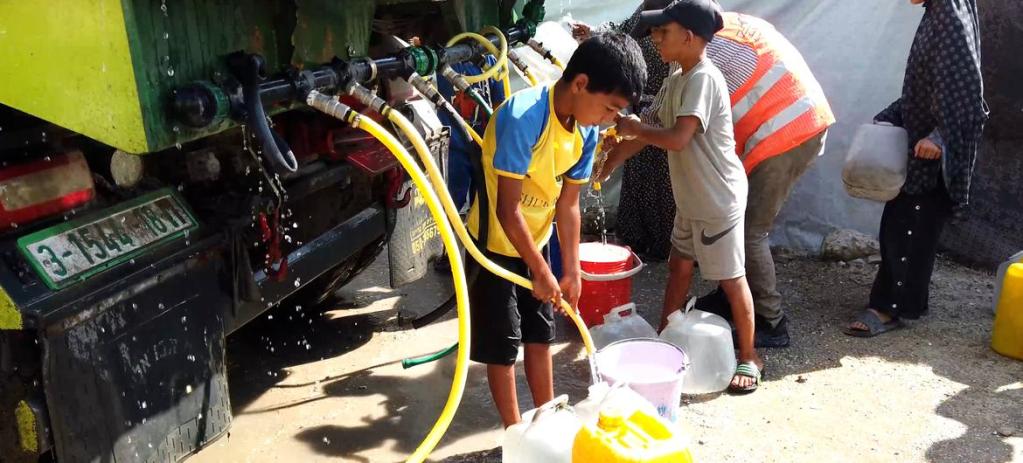
Press Release
28 November 2025
OHCHR: We are apalled at the brazen killing of two Palestinian men in Jenin
Killings of Palestinians by Israeli security forces and settlers in the occupied West Bank have been surging, without accountability, even in the rare cases when investigations are announced. Following yesterday’s incident, which was caught on film by a TV channel, an internal review was announced. But statements by a senior Israeli government official sought to absolve Israeli security forces of responsibility, raising serious concerns about the credibility of any future review or investigation conducted by any entity that is not fully independent from the Government.Our Office has verified that since 7 October 2023 and up until 27 November 2025, Israeli forces and settlers killed 1,030 Palestinians in the occupied West Bank, including East Jerusalem. Among these victims were 223 children.Impunity for Israel security forces’ unlawful use of force, and ever-growing Israeli settler violence, must end. UN High Commissioner for Human Rights Volker Türk urges independent, prompt and effective investigations into the killings of Palestinians, and that those responsible for violations be held fully to account.
1 of 5
Press Release
18 November 2025
The Ramallah Municipality launches the first Palestinian VLR as part of Inter-regional SDG Localization Workshop
Amman, 12 November 2025, as part of the Inter-regional SDG Localization Workshop, the Ramallah Municipality launched its first Voluntary Local Review during a special session held in the Jordanian capital, with the participation of representatives from the United Nations, local governments, civil society, and academia from across the Arab region.This initiative comes within the framework of local and regional efforts aimed at localizing the Sustainable Development Goals in Palestine. The activity was carried out under the project titled “Fostering COVID-19 recovery and SDG implementation through local action in Asia-Pacific, Arab and African countries”. Such reviews have become a key tool for localizing the seventeen Sustainable Development Goals globally. They represent a pioneering approach that strengthens the capacity of cities to measure progress, share experiences, and align policies based on clear evidence.The Ramallah Municipality has adopted a participatory approach, led by a steering committee comprising the Ministries of Planning and International Cooperation and the Ministry of Local Government, Palestinian Central Bureau of Statistics, the Association of Palestinian Local Authorities, in addition to representatives from various departments within the Ramallah Municipality, alongside the Municipal Council for Children and a number of active civil society organizations contributing to the city’s social and cultural identity. This document serves as a roadmap for aligning Ramallah City’s strategic objectives and local development plans with global sustainability standards, by highlighting progress made across six key Sustainable Development Goals: Quality Education (Goal 4), Decent Work and Economic Growth (Goal 8), Sustainable Cities and Communities (Goal 11), Climate Action (Goal 13), Peace, Justice, and Strong Institutions (Goal 16), and Partnerships for the Goals (Goal 17).In this context, Ms. Rania Hedeya, Regional Director of UN-Habitat, emphasized that “Ramallah today is part of a growing regional and global movement of cities striving to achieve the Sustainable Development Goals,” underscoring that “UN-Habitat remains committed to translating the Sustainable Development Goals into tangible realities across the Arab region, with a particular focus on Goal 11, which concerns building inclusive, safe, and resilient cities.”Mr. Ahmed Abu Luban, City Director and Chair of the steering committee for the Voluntary Local Review, also emphasized that “sustainable development begins in cities, and despite the significant challenges, Ramallah is moving forward with confident steps.” He noted that “this review was not merely a moment for assessment and evaluation, but a platform for development and change.” He further affirmed that this initiative, in alignment with Ramallah Municipality’s strategy and vision, complements the municipality’s other initiatives, as “we view each initiative as a link in an interconnected and integrated chain, reflecting our understanding and commitment to a Horizontal Integrative Approach.”
1 of 5
Press Release
07 November 2025
Mass demolition orders threaten forced displacement in Umm Al Khair–South Hebron Hills
The demolition orders threaten a new wave of forced displacement of Umm Al Khair residents—a community of 35 extended families who have lived there since their expulsion from their lands in Negev during the mass forcible displacement of Palestinians in 1948-1949, known as the Nakba. For years, Israeli authorities have subjected Umm Al Khair residents to persistent discriminatory land regulations enforced by the Israeli Civil Administration, as well as several rounds of systematic Israeli demolitions of Palestinian structures and associated displacements. Similar to other Palestinian villages in the South Hebron Hills and nearby Masafer Yatta, the Israeli authorities consider most Palestinian structures in Umm Al Khair to be illegal for lacking Israeli building permits, which are almost impossible for Palestinians to obtain. In the meantime, Israeli settlers have been allowed to expand settlements and to build new outposts connected to the nearby Carmel settlement. In September, settlers erected an outpost in the centre of Umm Al Khair and intensified harassment of the Palestinian residents to force them to leave. Despite a temporary injunction order issued by the Jerusalem District Court to stop construction and bar settlers from entering the outpost, authorities have taken no action to enforce the order, in stark contrast to the frequent and swift demolitions of Palestinian structures. The impunity extends to unchecked settler violence, which has surged since 7 October 2023. On 28 July 2025, a well-known Israeli settler shot and killed Palestinian rights defender Owdeh Hathaleen during a protest against the construction of a new settlement road on the community land. Hathaleen recorded his own shooting, and a video filmed by another resident clearly identified the shooter. But the accused was detained on house arrest for three days and then released with no further consequences. In 2024, the International Court of Justice concluded that Israel’s expansion of settlements, demolition of Palestinian homes and property, movement restrictions, and discriminatory zoning measures have created a coercive environment compelling the displacement of Palestinians, which constitutes forcible transfer and amounts to a war crime. “The case of Umm Al Khair is emblematic of an ever-escalating wave of Israeli steps to consolidate its annexation of the West Bank, particularly Area C, in violation of international law,” said Ajith Sunghay, Head of the UN Human Rights office in the Occupied Palestinian Territory. “Time is ticking. The international community must exercise pressure to protect Umm Al Khair residents from the imminent threat of forced displacement, and from any further violence and dispossession.”
1 of 5
Press Release
28 October 2025
Israeli settler attacks surging: displacement and steps to annex intensify in the occupied West Bank
The olive harvestOn 24 October, a video verified by the UN Human Rights office in the Occupied Palestinian Territory shows an Israeli settler, joined by Israeli security forces, together severely assaulting a 58-year-old olive farmer in Nahhalin, Bethlehem.The Israeli military said the incident is being investigated. However, settlers and Israeli security forces have so far enjoyed complete impunity for attacks against Palestinians, even deadly ones. Attacks against Bedouin communitiesSettler violence is escalating far beyond the olive harvest season, making life impossible for Palestinians in many communities across the occupied West Bank and leaving them with no genuine choice but to leave their homes.In another grave incident on Saturday, 25 October, a mob of masked Israeli settlers first attacked Palestinians picking olives in Mikhmas, then set fire to six Palestinian homes in the nearby Khallet As Sidra, a Bedouin Palestinian community northeast of occupied East Jerusalem.According to monitoring by the UN Human Rights office, the community, like many others in the West Bank, has been repeatedly attacked by Israeli settlers over the past two years to force residents to leave and expand illegal outposts in the area. Recently, all Palestinian women and children relocated from Khillet As Sidra for safety reasons, and the men stayed to prevent seizure of their homes by settlers. The Saturday arson reportedly engulfed several of the homes held by the remaining men. During the attack, settlers also injured five Palestinian men and two Israeli women solidarity activists. As Israel escalates its campaign of forced transfer to clear large swaths of the occupied West Bank from Palestinian residents, entire Bedouin communities have been displaced over the past two years. According to the UN Office for Coordination of Humanitarian Affairs (OCHA), about 3,200 Palestinians from dozens of Bedouin and herding communities have been forcibly displaced by settler violence and movement restrictions since 7 October 2023, mostly from Area C. Consolidating annexationOver the past year, there have been 84 new settler outposts compared to 49 the year before, according to data from the Israeli NGO Peace Now. This marks a rapid escalation compared to the yearly average of eight outposts in the past decade. In association, settler violence is also surging with 757 attacks recorded in the first half of 2025 alone- 13 per cent higher than the same period last year. Most attacks have been recorded in Area C, which is increasingly being emptied of Palestinians. However, the UN Human Rights office has also been increasingly documenting attacks in Area B, indicating an ever-shrinking space for Palestinians. The International Court of Justice concluded that the occupation must end, and Israel must withdraw from all the Occupied Palestinian Territory, both the West Bank and Gaza. This includes immediately dismantling all settlements and evacuating all settlers.
1 of 5
Press Release
23 October 2025
With UN-Habitat support, 25 families in Gaza Strip will start repairing their homes
Gaza, 22 October 2025 - Amidst critical humanitarian needs, the United Nations Human Settlements Programme (UN-Habitat), in partnership with the Palestinian Housing Council (PHC) and with generous funding from the Government of Japan, has launched a vital initiative to rehabilitate partially damaged homes in the Gaza Strip. Implemented under the project “Urgent Early Recovery and Resilience Building Towards Reconstruction in the Gaza Strip,” this intervention supports immediate relief efforts while empowering affected families to rebuild their homes with dignity. By adopting a self-help approach, the project empowers affected communities to take an active role in repairing and rehabilitating their own homes, fostering a sense of ownership, resilience, and recovery.As winter approaches in Gaza, and in light of the recent positive developments following the announcement of a ceasefire, this intervention comes at a crucial moment. The initiative is critical for the well-being of families who lost their homes and have been enduring dire living conditions. This community-driven model not only addresses urgent shelter needs but also contributes to alleviating the broader humanitarian crisis. It provides emotional and social support by helping families return to their original homes, restoring a sense of stability and normalcy in their lives.Ms. Rania Hedeya, Regional Director of UN-Habitat, highlighted that “the importance of this initiative goes beyond addressing the immediate and urgent needs of affected families. Its true value lies in its scalability and sustainability, as it offers a replicable model that strengthens community engagement, promotes livelihood opportunities, and ensures cost-effective and efficient implementation. Through the self-help approach, this model can be expanded across multiple neighbourhoods in the Gaza Strip, empowering communities to actively participate in the recovery and reconstruction process.” On the work methodology and implementation on the ground, Chairman of the PHC, Dr. Samih Al Abed, explained that PHC implements a locally led, area-based self-help model: “we begin with rapid structural-safety assessments, prioritize households through dynamic maps, issue clear technical guidance and standardized materials lists, and disburse targeted grants on payments linked with the achievement under mutual-commitment agreements. Then we verify quality through field visits and digital monitoring to ensure safe, dignified, and cost-effective repairs that accelerate families’ return home.”Ambassador for the Palestinian Affairs and Representative of Japan to Palestine Mr. ARAIKE Katsuhiko stated: “Japan remains steadfast in its support for the Palestinian people facing dire situation through various projects including this which is implemented by UN-Habitat to help rebuild lives and strengthen communities through community-led housing rehabilitation. Japan continues to be committed to working hand in hand with our partners in the Palestinian government, civil society, and the private sector to improve the humanitarian and economic situation in Gaza Strip and West Bank, and strengthen the bonds of friendship and cooperation between Japan and Palestine.”
1 of 5
Latest Resources
1 / 11
Resources
18 February 2025
Resources
20 September 2022
1 / 11





















